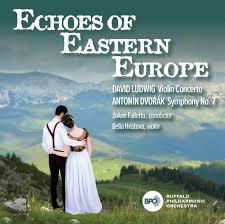DVOŘÁK Symphony No 7 LUDWIG Violin Concerto (Bella Hristova)
View record and artist detailsRecord and Artist Details
Genre:
Orchestral
Label: Buffalo Philharmonic Orchestra
Magazine Review Date: 07/2024
Media Format: CD or Download
Media Runtime: 58
Mastering:
DDD

Tracks:
| Composition | Artist Credit |
|---|---|
| Symphony No. 7 |
Antonín Dvořák, Composer
Buffalo Philharmonic Orchestra JoAnn Falletta, Conductor |
| Violin Concerto |
David Ludwig, Composer
Bella Hristova, Violin Buffalo Philharmonic Orchestra JoAnn Falletta, Conductor |
Author: David Patrick Stearns
Though there’s much ingratiating listening here, the Buffalo Philharmonic’s self-produced disc is most important as a calling card to show what kind of music-making is happening at its Kleinhans Music Hall home base. Acoustics are resonant, new music is afoot and the playing is not just solid but highly engaged under JoAnn Falletta, music director since 1999. How the Dvořák performance rates with the best out there and whether David Ludwig’s Violin Concerto is a major addition to the repertoire isn’t the point. Based on this disc, listeners in the City of No Illusions (Buffalo’s nickname in times of economic distress) have it quite good.
Other conductors have given Dvořák more bite but Falletta makes no apologies for the composer’s mellifluousness in an approach that’s marvellously lyrical in its phrase-shaping, enlisting all symphonic elements in support but never undercutting the triple-metre rhythm of the first movement. Brass and woodwinds play in Philadelphia Orchestra manner – substantial and present but more about force in reserve than aggression. If anything, the sound envelope seems too airbrushed. Details are there and the acoustic flatters the highly cultivated string tone but the ambience is too much of a good thing, making the performance seem distant when immediacy is more in order.
The Ludwig Concerto is programmatic, inspired (the composer writes) ‘by an imagined sequence of an ancient Slavonic wedding ceremony’ and quotes music by Yuri Chichov, father of the Bulgarian violin soloist Bella Hristova, who happens to be the composer’s wife. Ludwig himself has Eastern European roots, his grandfather being Rudolf Serkin, who was born in what was then Bohemia.
I want to like the concerto more than I do. Though the past century has seen great concertos written by Béla Bartók and André Previn for their spouses, this one seems unduly safe. After some imposing, brass-dominated blocks of chords (it’s hard to say what they have to do with the wedding scenario), the concerto has a series of well-chosen melodies with haunting Slavic inflections that are used with considerable expressive impact in the slow movement. But secondary and transitional motifs seem like structural placeholders or, at worst, generic concerto gestures. Cadenzas are generously frequent, expansive and virtuosic, plus a third movement – similar to that of Barber’s Violin Concerto – full of more pyrotechnics and fun motivic interplay between soloist and orchestra. Hristova plays with great relish and complete commitment. Falletta is equally committed in her role as an accompanist. But I don’t anticipate revisiting this concerto often.
Discover the world's largest classical music catalogue with Presto Music.

Gramophone Digital Club
- Digital Edition
- Digital Archive
- Reviews Database
- Full website access
From £8.75 / month
Subscribe
Gramophone Full Club
- Print Edition
- Digital Edition
- Digital Archive
- Reviews Database
- Full website access
From £11.00 / month
Subscribe
If you are a library, university or other organisation that would be interested in an institutional subscription to Gramophone please click here for further information.




